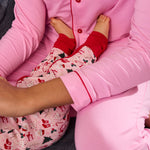1. Most breast cancers aren’t hereditary.
Most incidents of breast cancer develop because of environmental or lifestyle factors alone, with no connection to a family history of cancer. This means you have more control over your personal risk factors by getting more active, eating healthier foods, and avoiding “risky” behaviors (smoking, alcohol consumption, etc.).
2. Bras don’t affect breast cancer risk.
Studies have shown no evidence that cancer risk is affected by what kind of bra a woman wears. This means you can keep wearing whatever bra makes you feel most comfortable, whether it’s an underwire bra, a sports bra, a sleep bra, or no bra at all.
3. Breast cancer can be treated during pregnancy.
While it doesn’t happen frequently, some women have discovered they have breast cancer while pregnant . Fortunately, a biopsy or surgery may be possible with no danger to the baby. Depending on the type of cancer and recommended level of treatment, chemo may even be possible.
4. Breast cancer screenings are safe while nursing.
The instances of breast cancer developing while a woman is breastfeeding are low, but some women do find lumps during this period. While this is an unnerving discovery, it’s important for nursing moms to know that mammograms and biopsies are safe and will have no effect on their breast milk.
5. Breastfeeding may lower the risk of breast cancer.
Studies have shown that pregnancy and delivery may reduce the risk of breast cancer developing, but some research suggests breastfeeding may reduce the risk as well. This may be linked to a reduction in exposure to ovarian hormones while pregnant and nursing due to fewer menstrual cycles. Additionally, pregnancy and nursing change breast cells; since these cells have already differentiated to produce milk, some researchers speculate they might be less likely to transform into cancer cells. Another possible reason is that the breast tissue you shed during lactation, particularly when you finish lactating, may result in the elimination of potentially damaged cells.
While breast cancer isn’t preventable, if you know the risk factors, you can make positive changes and get the recommended screenings; early detection really can make a difference. If you have any concerns about your health, be sure to reach out to your doctor or other health care providers.
Additional resources:
- American Cancer Society: Treating Breast Cancer During Pregnancy
- National Cancer Institute: Reproductive History and Cancer Risk
- Dana-Farber Cancer Institute: Ten Myths About Breast Cancer
- BreastCancer.org: Breastfeeding
- National Breast Cancer Foundation, Inc.: Breast Cancer Myths
- BreastCancer.org: Breast Cancer Myths vs. Facts
- Health: 25 Breast Cancer Myths Busted
- Breastfeeding Today: Cancer and Breastfeeding




